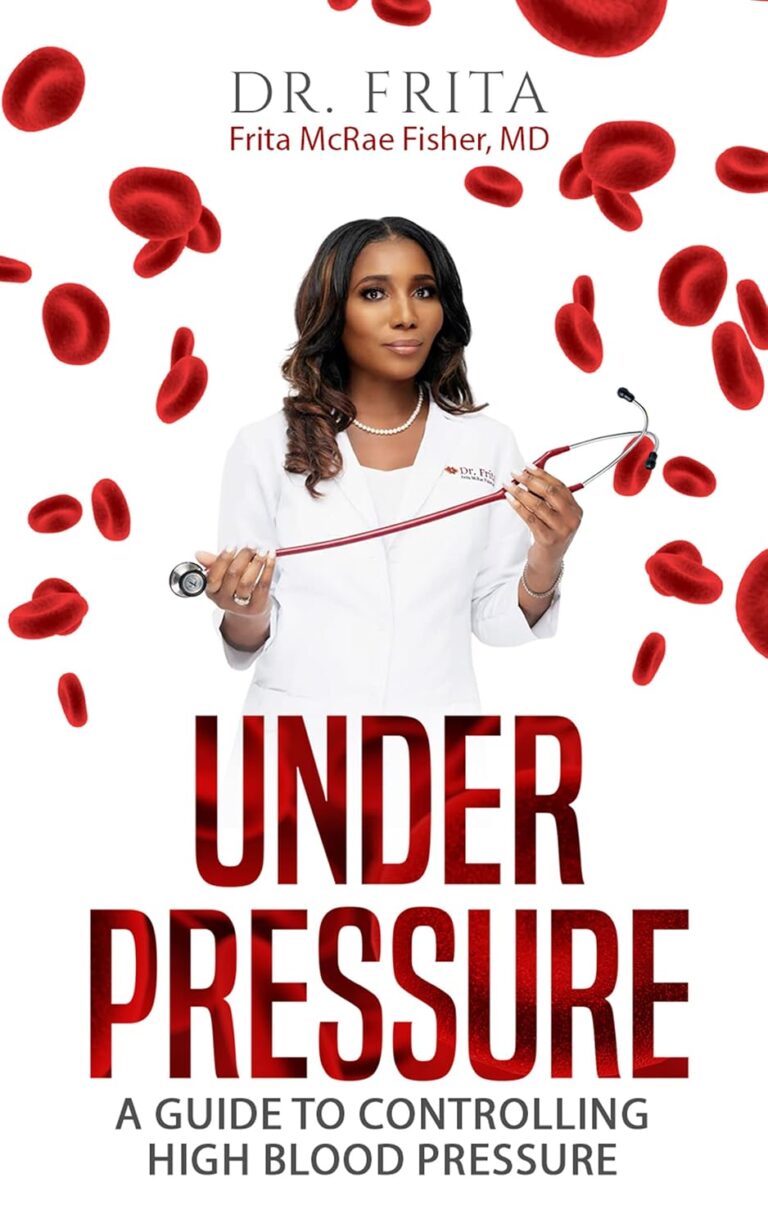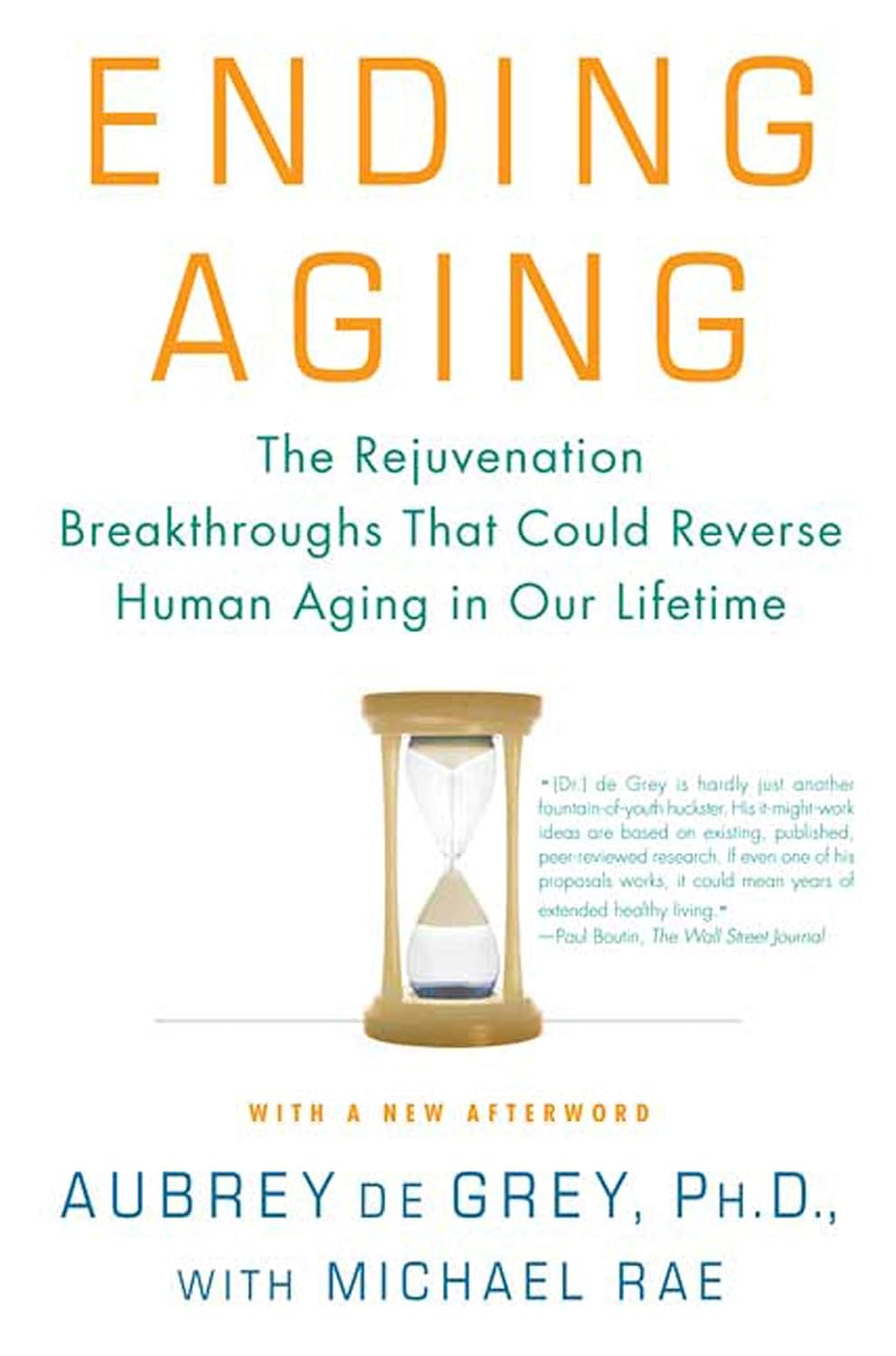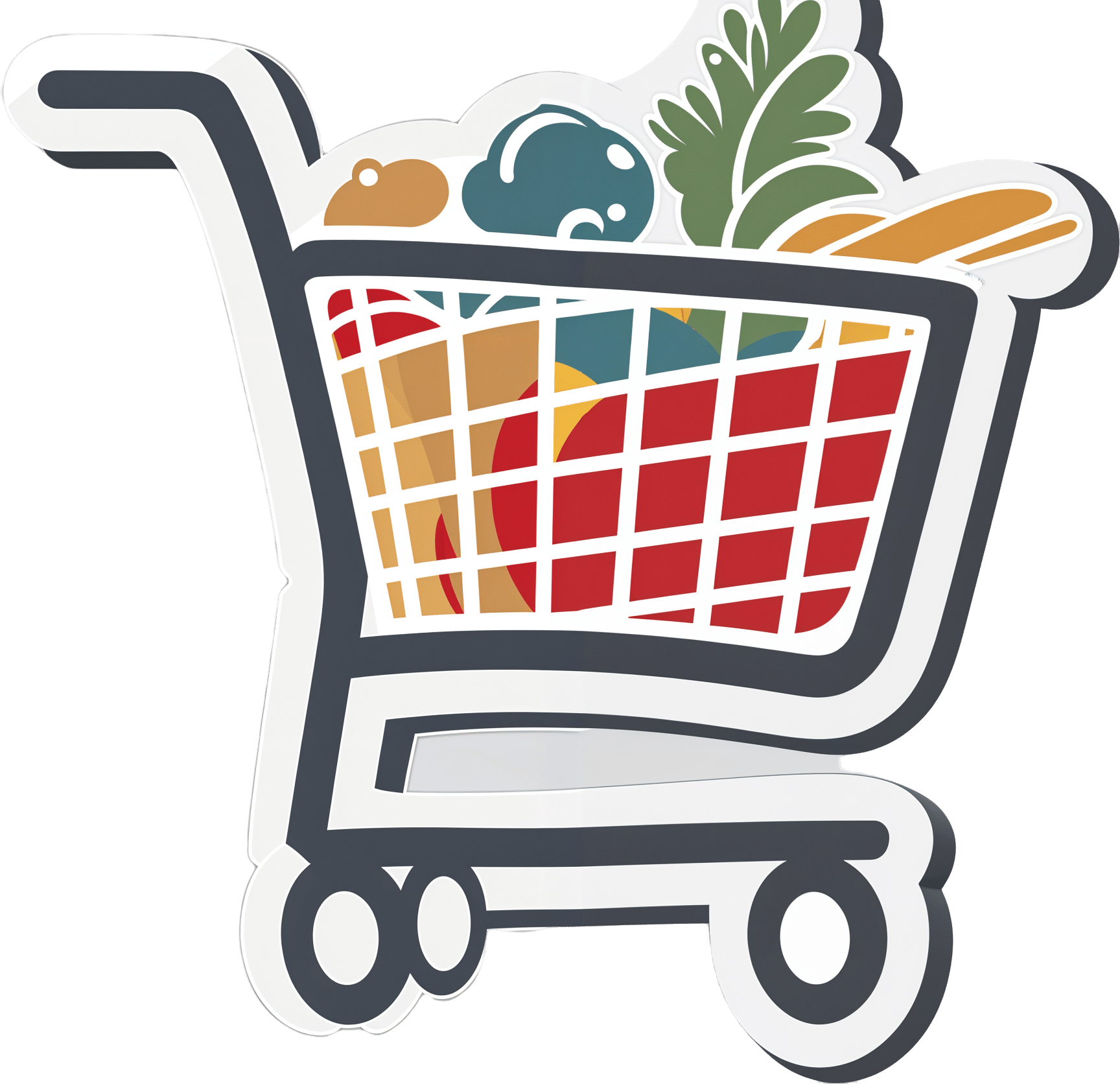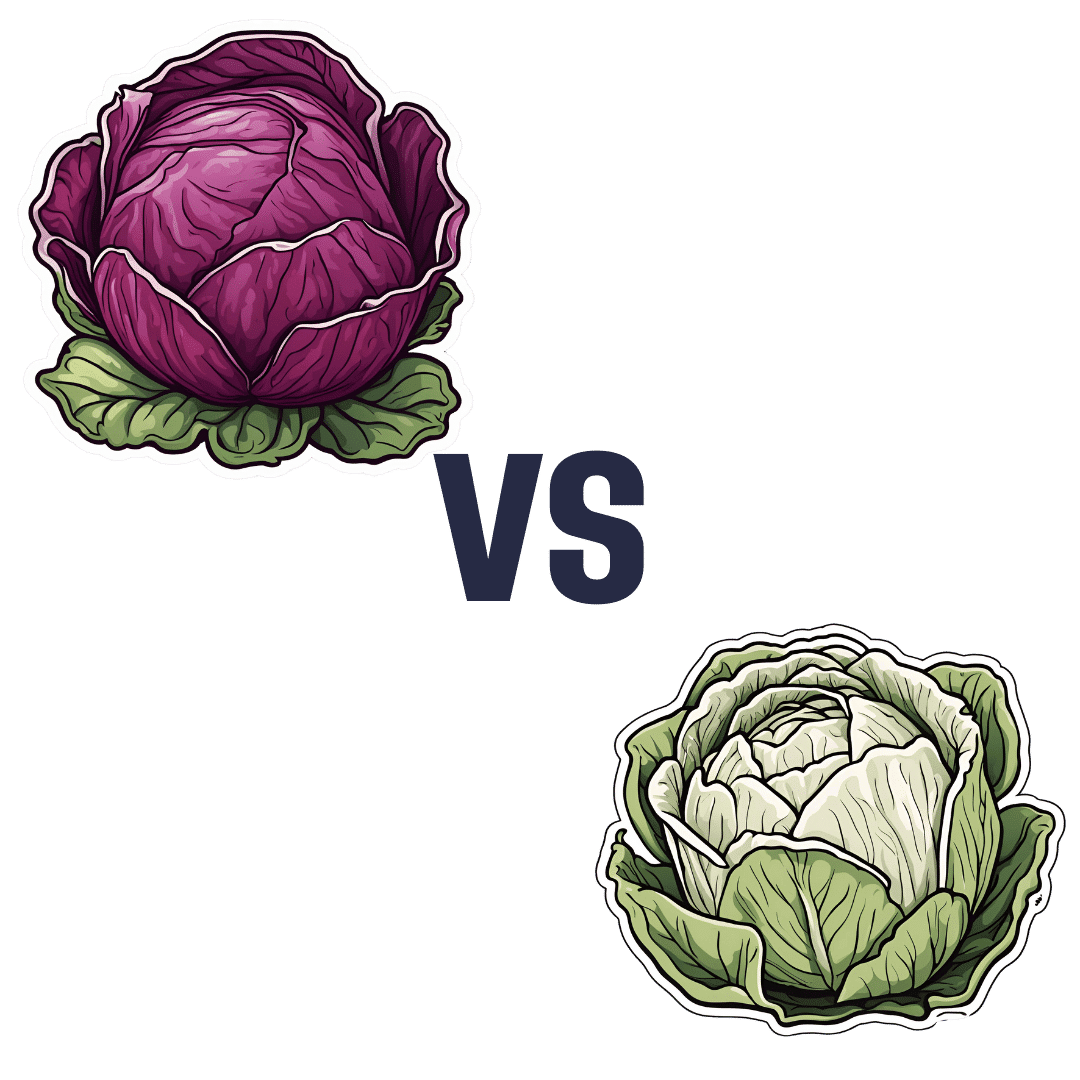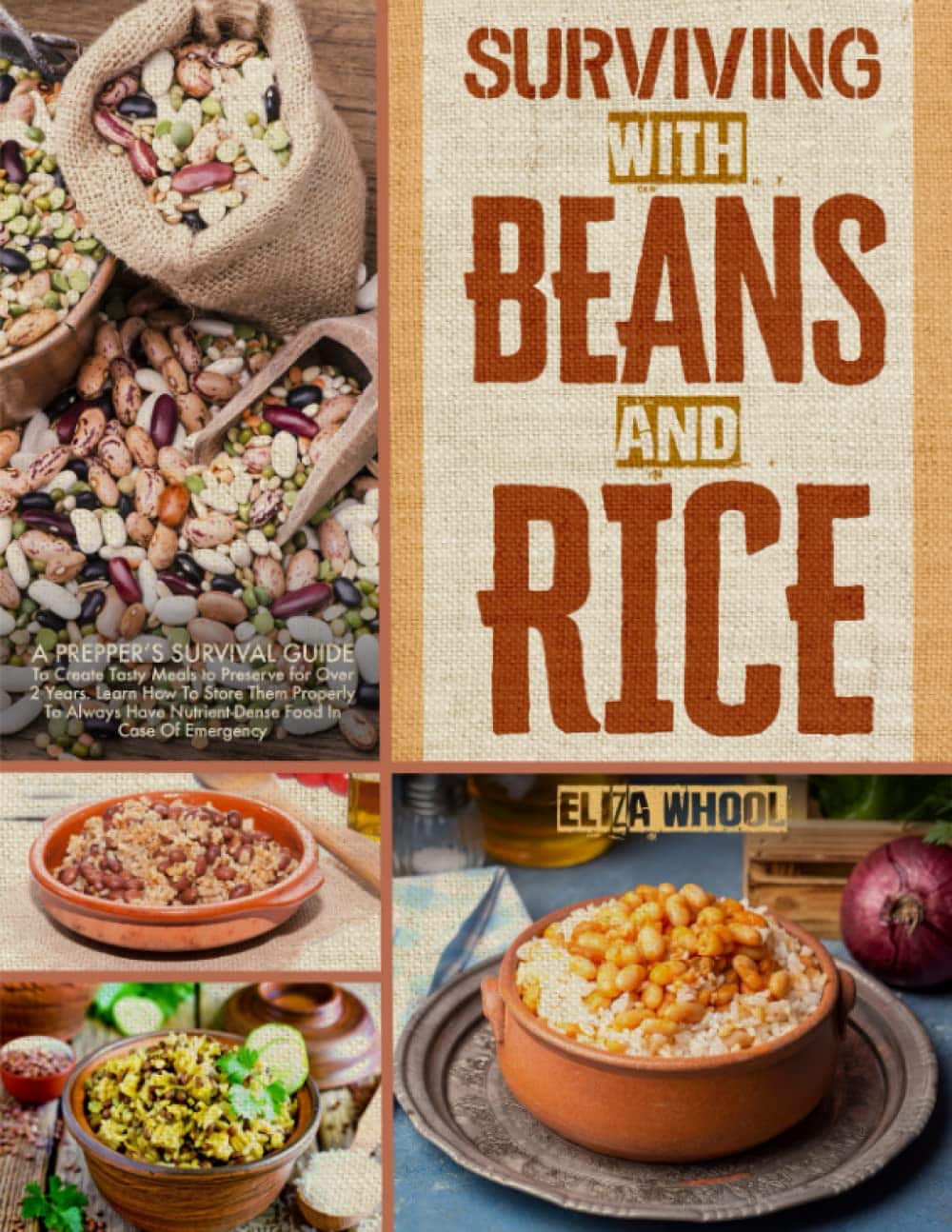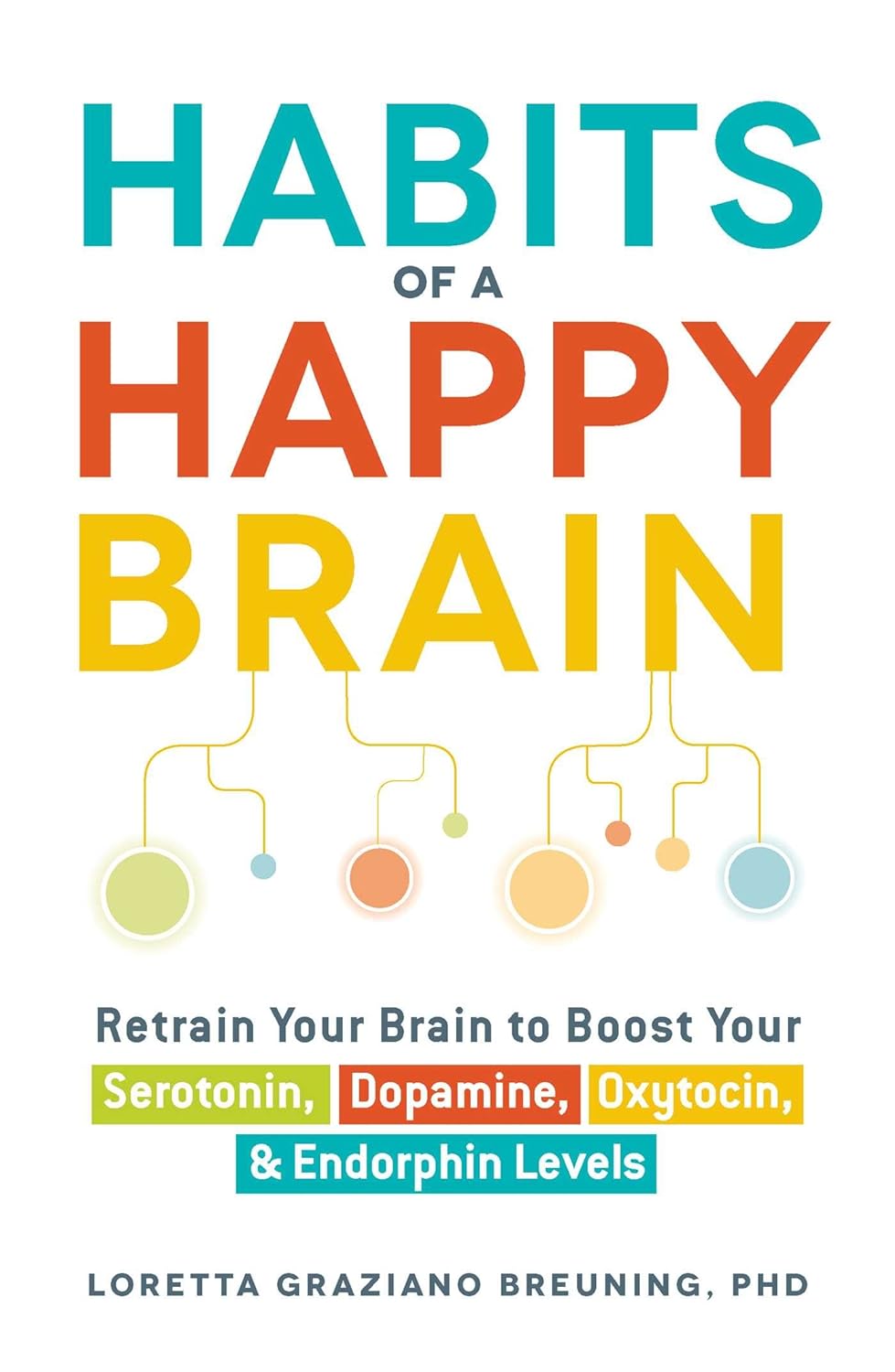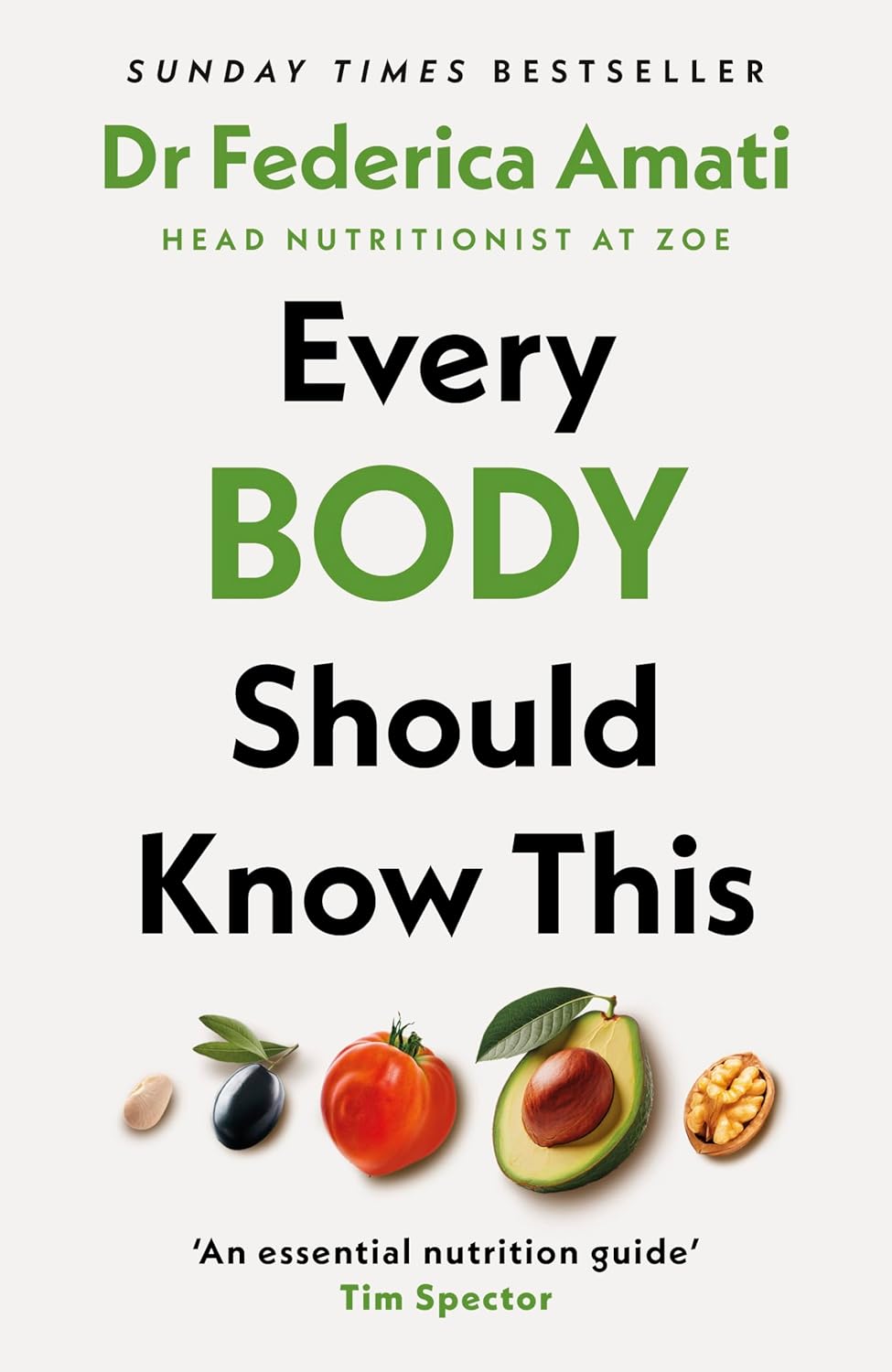
Every Body Should Know This – by Dr. Federica Amati
10almonds is reader-supported. We may, at no cost to you, receive a portion of sales if you purchase a product through a link in this article.
This book is very much a primer on how to eat healthily. The science is high-quality (the author is the head nutritionist at ZOE) and well-explained, and the advice is reasonable.
Limitations: this book is not very deep, which we might expect from a book with this title. So, if you’ve been a long-time 10almonds reader, you might not learn a lot here, and this book might make a better gift for someone else.
In particular, the book may be well-suited for someone who is thinking of having children soon, as there is an unusual amount of focus on fertility and young motherhood—perhaps because the author herself has young children and so was preoccupied with this when writing. For those of us who are definitely not having any more children, the focus on young motherhood is a little superfluous.
The writing style is very readable pop-science, and nobody who is able to read English is likely to struggle with this one. It’s also quite conversational in parts, as the author discusses her own experiences with implementing the science at hand.
Bottom line: if you want a good, solid, primer of how to eat well for a lifetime of health, especially if you are (or are thinking of becoming) a young mother, then this is a very good book. Otherwise, it’s probably a better to give it as a gift.
Click here to check out Every Body Should Know This, and know the things!
Don’t Forget…
Did you arrive here from our newsletter? Don’t forget to return to the email to continue learning!
Recommended
Learn to Age Gracefully
Join the 98k+ American women taking control of their health & aging with our 100% free (and fun!) daily emails:
-
Ending Aging – by Dr. Aubrey de Grey
10almonds is reader-supported. We may, at no cost to you, receive a portion of sales if you purchase a product through a link in this article.
We know about how to slow aging. We know about diet, exercise, sleep, intermittent fasting, and other lifestyle tweaks to make. But how much can we turn back the clock, according to science?
Dr. Aubrey de Grey’s foundational principle is simple: the body is a biological machine, and aging is fundamentally an engineering problem.
He then outlines the key parts to that problem: the princple ways in which cells (and DNA) get damaged, and what we need to do about that in each case. Car tires get damaged over time; our approach is to replace them within a certain period of time so that they don’t blow out. In the body, it’s a bit similar with cells so that we don’t get cancer, for example.
The book goes into detail regards each of the seven main ways we accumulate this damage, and highlights avenues of research looking to prevent it, and in at least some cases, the measures already available to so.
Bottom line: if you want a hard science overview of actual rejuvenation research in biogerontology, this is a book that presents that comprehensively, without assuming prior knowledge.
Click here to check out Ending Aging and never stop learning!
Share This Post
-
Small Changes For A Healthier Life
10almonds is reader-supported. We may, at no cost to you, receive a portion of sales if you purchase a product through a link in this article.
It’s Q&A Day at 10almonds!
Have a question or a request? You can always hit “reply” to any of our emails, or use the feedback widget at the bottom!
In cases where we’ve already covered something, we might link to what we wrote before, but will always be happy to revisit any of our topics again in the future too—there’s always more to say!
As ever: if the question/request can be answered briefly, we’ll do it here in our Q&A Thursday edition. If not, we’ll make a main feature of it shortly afterwards!
So, no question/request too big or small
I am interested in what I can substitute for ham in bean soup?
Well, that depends on what the ham was like! You can certainly buy ready-made vegan lardons (i.e. small bacon/ham bits, often in tiny cubes or similar) in any reasonably-sized supermarket. Being processed, they’re not amazing for the health, but are still an improvement on pork.
Alternatively, you can make your own seitan! Again, seitan is really not a health food, but again, it’s still relatively less bad than pork (unless you are allergic to gluten, in which case, definitely skip this one).
Alternatively alternatively, in a soup that already contains beans (so the protein element is already covered), you could just skip the ham as an added ingredient, and instead bring the extra flavor by means of a little salt, a little yeast extract (if you don’t like yeast extract, don’t worry, it won’t taste like it if you just use a teaspoon in a big pot, or half a teaspoon in a smaller pot), and a little smoked paprika. If you want to go healthier, you can swap out the salt for MSG, which enhances flavor in a similar fashion while containing less sodium.
Wondering about the health aspects of MSG? Check out our main feature on this, from last month:
I thoroughly enjoy your daily delivery. I’d love to see one for teens too!
That’s great to hear! The average age of our subscribers is generally rather older, but it’s good to know there’s an interest in topics for younger people. We’ll bear that in mind, and see what we can do to cater to that without alienating our older readers!
That said: it’s never too soon to be learning about stuff that affects us when we’re older—there are lifestyle factors at 20 that affect Alzheimer’s risk at 60, for example (e.g. drinking—excessive drinking at 20* is correlated to higher Alzheimer’s risk at 60).
*This one may be less of an issue for our US readers, since the US doesn’t have nearly as much of a culture of drinking under 21 as some places. Compare for example with general European practices of drinking moderately from the mid-teens, or the (happily, diminishing—but historically notable) British practice of drinking heavily from the mid-teens.
How much turmeric should I take each day?
Dr. Michael Greger’s research (of “Dr. Greger’s Daily Dozen” and “How Not To Die” fame) recommends getting at least ¼ tsp turmeric per day
Remember to take it with black pepper though, for a 2000% absorption bonus!
A great way to get it, if you don’t want to take capsules and don’t want to eat spicy food every day, is to throw a teaspoon of turmeric in when making a pot of (we recommend wholegrain!) rice. Turmeric is very water-soluble, so it’ll be transferred into the rice easily during cooking. It’ll make the rice a nice golden yellow color, and/but won’t noticeably change the taste.
Again remember to throw in some black pepper, and if you really want to boost the nutritional content,some chia seeds are a great addition too (they’ll get cooked with the rice and so it won’t be like eating seeds later, but the nutrients will be there in the rice dish).
You can do the same with par-boiled potatoes or other root vegetables, but because cooking those has water to be thrown away at the end (unlike rice), you’ll lose some turmeric in the water.
Request: more people need to be aware of suicidal tendencies and what they can do to ward them off
That’s certainly a very important topic! We’ll cover that properly in one of our Psychology Sunday editions. In the meantime, we’ll mention a previous special that we did, that was mostly about handling depression (in oneself or a loved one), and obviously there’s a degree of crossover:
The Mental Health First-Aid That You’ll Hopefully Never Need
Share This Post
-
Red Cabbage vs White Cabbage – Which is Healthier?
10almonds is reader-supported. We may, at no cost to you, receive a portion of sales if you purchase a product through a link in this article.
Our Verdict
When comparing red cabbage to white cabbage, we picked the red.
Why?
Perhaps you guessed this one, based on the “darker and/or more colorful foods are usually more nutritionally dense” dictum. That’s not always true, by the way, but it is a good rule of thumb and it is correct here. In the case of cabbages, each type is a nutritional powerhouse, but red does beat white:
In terms of macros, they’re quite comparable. They’re both >90% water with just enough other stuff (carbs, fiber, protein) to hold them together, and the “other stuff” in question is quite similarly proportioned in both cases. Within the carbs, even the sugar breakdown is similar. There are slight differences, but the differences are not only tiny, but also they balance out in any case.
When it comes to vitamins, as you might expect, the colorful red cabbage does better with more of vitamins A, B1, B2, B3, B6, C, and choline, while white has more of vitamins B5, B9, E, and K. So, a 7:4 win for red.
In the category of minerals, it’s even more polarized; red cabbage has more calcium, iron, magnesium, manganese, phosphorus, potassium, selenium, and zinc. On the other hand, white contains a tiny amount more copper.
In short, both are great (red just makes white look bad by standing next to it, but honestly, white has lots of all those same things too, just not quite as much as red), and this writer will continue to use white when making her favorite shchi, but if you’re looking for the most nutritionally dense option, it’s red.
Want to learn more?
You might like to read:
Enjoy Bitter Foods For Your Heart & Brain
Take care!
Share This Post
Related Posts
-
Surviving with Beans And Rice – by Eliza Whool
10almonds is reader-supported. We may, at no cost to you, receive a portion of sales if you purchase a product through a link in this article.
If you’d like to be well-set the next time a crisis shuts down supply lines, this is one of those books you’ll want to have read.
Superficially, “have in a large quantity of dried beans and rice” is good advice, but obvious. Why a book?
Whool gives a lot of advice on keeping your nutrition balanced while subsisting on the same quite few ingredients, which is handy.
More than that, she offers 100 recipes using the ingredients that will be in your long-term pantry. That’s over three months without repeating a meal! And if you don’t think rice and beans can be tasty and exciting and varied, then most of the chefs of the Global South might want to have a word about that.
Anyway, we’re not here to sell you rice and beans (we’re just enthusiastic and correct). What we are here to do is to give you a fair overview of this book.
The recipes are just-the-recipes, very simple clear instructions, one two-page spread per recipe. Most of the book is devoted to these. As a quick note, it does cover making things gluten-free if necessary, and other similar adjustments for medical reasons.
The planning-and-storage section of the book is helpful too though, especially as it covers common mistakes to avoid.
Bottom line: this is a great book, and remember what we said about doing the things now that future you will thank you for!
Get yourself a copy of Surviving with Beans And Rice from Amazon today!
Don’t Forget…
Did you arrive here from our newsletter? Don’t forget to return to the email to continue learning!
Learn to Age Gracefully
Join the 98k+ American women taking control of their health & aging with our 100% free (and fun!) daily emails:
-
What you need to know about PCOS
10almonds is reader-supported. We may, at no cost to you, receive a portion of sales if you purchase a product through a link in this article.
In 2008, microbiologist Sasha Ottey saw her OB-GYN because she had missed some periods. The doctor ran blood tests and gave her an ultrasound, diagnosing her with polycystic ovary syndrome (PCOS). She also told her not to worry, referred her to an endocrinologist (a doctor who specializes in hormones), and told her to come back when she wanted to get pregnant.
“I found [that] quite dismissive because that was my reason for presenting to her,” Ottey tells PGN. “I felt that she was missing an opportunity to educate me on PCOS, and that was just not an accurate message: Missing periods can lead to other serious, life-threatening health conditions.”
During the consultation with the endocrinologist, Ottey was told to lose weight and come back in six months. “Again, I felt dismissed and left up to my own devices to understand this condition and how to manage it,” she says.
Following that experience, Ottey began researching and found that thousands of people around the world had similar experiences with their PCOS diagnoses, which led her to start and lead the advocacy and support organization PCOS Challenge.
PCOS is the most common hormonal condition affecting people with ovaries of reproductive age. In the United States, one in 10 women of childbearing age have the condition, which affects the endocrine and reproductive systems and is a common cause of infertility. Yet, the condition is significantly underdiagnosed—especially among people of color—and under-researched.
Read on to find out more about PCOS, what symptoms to look out for, what treatments are available, and useful resources.
What is PCOS, and what are its most common symptoms?
PCOS is a chronic hormonal condition that affects how the ovaries work. A hormonal imbalance causes people with PCOS to have too much testosterone, the male sex hormone, which can make their periods irregular and cause hirsutism (extra hair), explains Dr. Melanie Cree, associate professor at the University of Colorado School of Medicine and director of the Multi-Disciplinary PCOS clinic at Children’s Hospital Colorado.
This means that people can have excess facial or body hair or experience hair loss.
PCOS also impacts the relationship between insulin—the hormone released when we eat—and testosterone.
“In women with PCOS, it seems like their ovaries are sensitive to insulin, and so when their ovaries see insulin, [they] make extra testosterone,” Cree adds. “So things that affect insulin levels [like sugary drinks] can affect testosterone levels.”
Other common symptoms associated with PCOS include:
- Acne
- Thinning hair
- Skin tags or excess skin in the armpits or neck
- Ovaries with many cysts
- Infertility
- Anxiety, depression, and other mental health conditions
- Sleep apnea, a condition where breathing stops and restarts while sleeping
What causes PCOS?
The cause is still unknown, but researchers have found that the condition is genetic and can be inherited. Experts have found that exposure to harmful chemicals like PFAs, which can be present in drinking water, and BPA, commonly used in plastics, can also increase the risk for PCOS.
Studies have shown that “BPA can change how the endocrine system develops in a developing fetus … and that women with PCOS tend to also have more BPA in their bodies,” adds Dr. Felice Gersh, an OB-GYN and founder and director of the Integrative Medical Group of Irvine, which treats patients with PCOS.
How is PCOS diagnosed?
PCOS is diagnosed through a physical exam; a conversation with your health care provider about your symptoms and medical history; a blood test to measure your hormone levels; and, in some cases, an ultrasound to see your ovaries.
PCOS is what’s known as a “diagnosis of exclusion,” Ottey says, meaning that the provider must rule out other conditions, such as thyroid disease, before diagnosing it.
Why isn’t more known about PCOS?
Research on PCOS has been scarce, underfunded, and narrowly focused. Research on the condition has largely focused on the reproductive system, Ottey says, even though it also affects many aspects of a person’s life, including their mental health, appearance, metabolism, and weight.
“There is the point of getting pregnant, and the struggle to get pregnant for so many people,” Ottey adds. “[And] once that happens, [the condition] also impacts your ability to carry a healthy pregnancy, to have healthy babies. But outside of that, your metabolic health is at risk from having PCOS, your mental health is at risk, [and] overall health and quality of life, they’re all impacted by PCOS.”
People with PCOS are more likely to develop other serious health issues, like high blood pressure, heart problems, high cholesterol, uterine cancer, and diabetes. Cree says that teenagers with PCOS and obesity have “an 18-fold higher risk of type 2 diabetes” in their teens and that teenagers who get type 2 diabetes are starting to die in their late 20s and early 30s.
What are some treatments for PCOS?
There is still no single medication approved by the Food and Drug Administration specifically for PCOS, though advocacy groups like PCOS Challenge are working with the agency to incorporate patient experiences and testimonials into a possible future treatment. Treatment depends on what symptoms you experience and what your main concerns are.
For now, treatment options include the following:
- Birth control: Your provider may prescribe birth control pills to lower testosterone levels and regulate your menstrual cycle.
- Lifestyle changes: Because testosterone can affect insulin levels, Cree explains that regardless of a patient’s weight, a diet with lower simple carbohydrates (such as candy, sugar, sweets, juices, sodas, and coffee drinks) is recommended.
“When you have a large amount of sugar like that, especially as a liquid, it gets into your bloodstream very quickly,” adds Cree. “And so you then release a ton of insulin that goes to the ovary, and you make a bunch of testosterone.”
More exercise is also recommended for both weight loss and weight maintenance, Cree says: “Food changes and better activity work directly to lower insulin, to lower testosterone.”
- Metformin: Even though it’s a medication for type 2 diabetes, it’s used in patients with PCOS because it can reduce insulin levels, and as a result, lower testosterone levels.
What should I keep in mind if I have (or think I may have) PCOS?
If your periods are irregular or you have acne, facial hair, or hair loss, tell your provider—it could be a sign that you have PCOS or another condition. And ask questions.
“I call periods a vital sign for women, if you’re not taking hormones,” Cree says. “Our bodies are really smart: Periods are to get pregnant, and if our body senses that we’re not healthy enough to get pregnant, then we don’t have periods. That means we’ve got to figure out why.”
Once you’re diagnosed, Ottey recommends that you “don’t go through extremes, yo-yo dieting, or trying to achieve massive weight loss—it only rebounds.”
She adds that “when you get this diagnosis, [there’s] a lot that might feel like it’s being taken away from you: ‘Don’t do this. Don’t eat this. Don’t do that.’ But what I want everyone to think of is what brings you joy, and do more of that and incorporate a lot of healthy activities into your life.”
Resources for PCOS patients:
- AskPCOS: A guide designed by experts on the condition that helps answer all your questions about it and how to manage it.
- PCOS Challenge: An advocacy and support organization for people with PCOS.
- PCOS Patient Communication Guide: A tool for better communication with your health care providers.
- Polycystic Ovary Syndrome Question Prompt List: Questions you can ask your provider about PCOS.
For more information, talk to your health care provider.
This article first appeared on Public Good News and is republished here under a Creative Commons license.
Don’t Forget…
Did you arrive here from our newsletter? Don’t forget to return to the email to continue learning!
Learn to Age Gracefully
Join the 98k+ American women taking control of their health & aging with our 100% free (and fun!) daily emails:
-
Habits of a Happy Brain – by Dr. Loretta Graziano Breuning
10almonds is reader-supported. We may, at no cost to you, receive a portion of sales if you purchase a product through a link in this article.
There are lots of books on “happy chemicals” and “how to retrain your brain”, so what makes this one different?
Firstly, it focuses on four “happy chemicals”, not just one:
- Serotonin
- Dopamine
- Oxytocin
- Endorphins
It also looks at the role of cortisol, and how it caps off each of those just a little bit, to keep us just a little malcontent.
Behavioral psychology tends to focus most on dopamine, while prescription pharmaceuticals for happiness (i.e., most antidepressants) tend to focus on serotonin. Here, Dr. Breuning helps us understand the complex interplay of all of the aforementioned chemicals.
She also clears up many misconceptions, since a lot of people misattribute the functions of each of these.
Common examples include “I’m doing this for the serotonin!” when the activity is dopaminergic not serotoninergic, or considering dopamine “the love molecule” when oxytocin, or even something else like phenylethylamine would be more appropriate.
The above may seem like academic quibbles and not something of practical use, but if we want to biohack our brains, we need to do better than the equivalent of a chef who doesn’t know the difference between salt and sugar.
Where things are of less practical use, she tends to skip over or at least streamline them. For example, she doesn’t really discuss the role of post-dopamine prolactin in men—but the discussion of post-happiness cortisol covers the same ground anyway, for practical purposes.
Dr. Breuning also looks at where our evolved neurochemical responses go wrong, and lays out guidelines for such challenges as overcoming addiction, or embracing delayed gratification.
Bottom line: this book is a great user-manual for the brain. If you’d like to be happier and more effective with fewer bad habits, this is the book for you.
Click here to check out Habits of a Happy Brain, and get biohacking yours!
Don’t Forget…
Did you arrive here from our newsletter? Don’t forget to return to the email to continue learning!
Learn to Age Gracefully
Join the 98k+ American women taking control of their health & aging with our 100% free (and fun!) daily emails:

